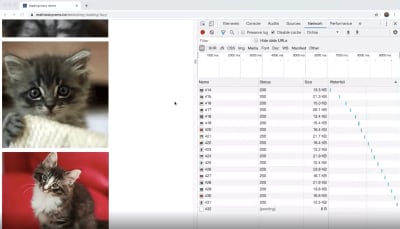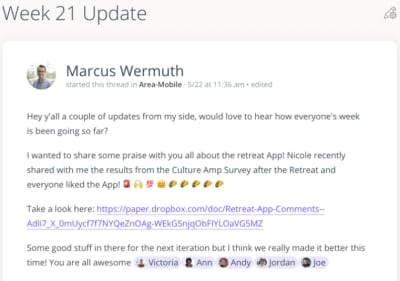Monthly Web Development Update 8/2019: Strong Teams And Ethical Data Sensemaking

Monthly Web Development Update 8/2019: Strong Teams And Ethical Data Sensemaking
Monthly Web Development Update 8/2019: Strong Teams And Ethical Data Sensemaking
Anselm Hannemann
2019-08-16T13:51:00+02:00
2019-08-16T12:35:43+00:00
What’s more powerful than a star who knows everything? Well, a team not made of stars but of people who love what they do, stand behind their company’s vision and can work together, support each other. Like a galaxy made of stars — where not every star shines and also doesn’t need to. Everyone has their place, their own strength, their own weakness. Teams don’t consist only of stars, they consist of people, and the most important thing is that the work and life culture is great. So don’t do a moonshot if you’re hiring someone but try to look for someone who fits into your team and encourages, supports your team’s values and members.
In terms of your own life, take some time today to take a deep breath and recall what happened this week. Go through it day by day and appreciate the actions, the negative ones as well as the positive ones. Accept that negative things happen in our lives as well, otherwise we wouldn’t be able to feel good either. It’s a helpful exercise to balance your life, to have a way of invalidating the feeling of “I did nothing this week” or “I was quite unproductive.” It makes you understand why you might not have worked as much as you’re used to — but it feels fine because there’s a reason for it.
News
- Three weeks ago we officially exhausted the Earth’s natural resources for the year — with four months left in 2019. Earth Overshoot Day is a good indicator of where we’re currently at in the fight against climate change and it’s a great initiative by people who try to give helpful advice on how we can move that date so one day in the (hopefully) near future we’ll reach overshoot day not before the end of the year or even in a new year.
- Chrome 76 brings the
prefers-color-schememedia query (e.g. for dark mode support) and multiple simplifications for PWA installation.
UI/UX
- There are times to use toggle switches and times not to. When designers misuse them, it leads to confused and frustrated users. Knowing when to use them requires an understanding of the different types of toggle states and options.
- Font Awesome introduced Duotone Icons. An amazing set that is worth taking a look at.
JavaScript
- Ben Frain explores the possibility of building a Progressive Web Application (PWA) without a framework. A quite interesting article series that shows the difference between relying on frameworks by default and building things from scratch.
Web Performance
- Some experiments sound silly but in reality, they’re not: Chris Ashton used the web for a day on a 50MB budget. In Zimbabwe, for example, where 1 GB costs an average of $75.20, ranging from $12.50 to $138.46, 50MB is incredibly expensive. So reducing your app bundle size, image size, and website cost are directly related to how happy your users are when they browse your site or use your service. If it costs them $3.76 (50MB) to access your new sports shoe teaser page, it’s unlikely that they will buy or recommend it.
- BBC’s Toby Cox shares how they ditched iframes in favor of ShadowDOM to improve their site performance significantly. This is a good piece explaining the advantages and drawbacks of iframes and why adopting ShadowDOM takes time and still feels uncomfortable for most of us.
- Craig Mod shares why people prefer to choose (and pay for) fast software. People are grateful for it and are easily annoyed if the app takes too much time to start or shows a laggy user interface.
- Harry Roberts explains the details of the “time to first byte” metric and why it matters.
CSS
- Yes,
prefers-reduced-motionisn’t super new anymore but still heavily underused on the web. Here’s how to apply it to your web application to serve a user’s request for reduced motion.
HTML & SVG
- With Chrome 76 we get the
loadingattribute which allows for native lazy loading of images just with HTML. It’s great to have a handy article that explains how to use, debug, and test it on your website today.

No more custom lazy-loading code or a separate JavaScript library needed: Chrome 76 comes with native lazy loading built in. (Image credit)
Accessibility
- The best algorithms available today still struggle to recognize black faces equally good as white ones. Which again shows how important it is to have diverse teams and care about inclusiveness.
Security
- Here’s a technical analysis of the Capital One hack. A good read for anyone who uses Cloud providers like AWS for their systems because it all comes down to configuring accounts correctly to prevent hackers from gaining access due to a misconfigured cloud service user role.
Privacy
- Safari introduced its Intelligent Tracking Prevention technology a while ago. Now there’s an official Safari ITP policy documentation that explains how it works, what will be blocked and what not.
- SmashingMag launched a print and eBook magazine all about ethics and privacy. It contains great pieces on designing for addiction, how to improve ethics step by step, and quieting disquiet. A magazine worth reading.
Work & Life
- “For a long time I believed that a strong team is made of stars — extraordinary world-class individuals who can generate and execute ideas at a level no one else can. These days, I feel that a strong team is the one that feels more like a close family than a constellation of stars. A family where everybody has a sense of predictability, trust and respect for each other. A family which deeply embodies the values the company carries and reflects these values throughout their work. But also a family where everybody feels genuinely valued, happy and ignited to create,” said Vitaly Friedman in an update thought recently and I couldn’t agree more.
- How do you justify a job in a company that has a significant influence on our world and our everyday lives and that not necessarily with the best intentions? Meredith Whittaker wrote up her story of starting at Google, having an amazing time there, and now leaving the company because she couldn’t justify it anymore that Google is using her work and technology to get involved in fossil energy business, healthcare, governance, and transportation business — and not always with the focus on improving everyone’s lives or making our environment a better place to live in but simply for profit.
- Synchronous meetings are a problem in nearly every company. They take a lot of time from a lot of people and disrupt any schedule or focused work. So here’s how Buffer switched to asynchronous meetings, including great tips and insights into why many tools out there don’t work well.
- Actionable advice is what we usually look for when reading an article. However, it’s not always possible or the best option to write actionable advice and certainly not always a good idea to follow actionable advice blindly. That’s because most of the time actionable advice also is opinionated, tailored, customized advice that doesn’t necessarily fit your purpose. Sharing experiences instead of actionable advice fosters creativity so everyone can find their own solution, their own advice.
- Sam Clulow’s “Our Planet, Our Problem” is a great piece of writing that reminds us of who we are and what’s important for us and how we can live in a city and switch to a better, more thoughtful and natural life.
- Climate change is a topic all around the world now and it seems that many people are concerned about it and want to take action. But then, last month we had the busiest air travel day ever in history. Airplanes are accountable for one of the biggest parts of climate active emissions, so it’s key to reduce air travel as much as possible from today on. Coincidentally, this was also the hottest week measured in Europe ever. We as individuals need to finally cut down on flights, regardless of how tempting that next $50-holiday-flight to a nice destination might be, regardless of if it’s an important business meeting. What do we have video conferencing solutions for? Why do people claim to work remotely if they then fly around the world dozens of times in their life? There are so many nice destinations nearby, reachable by train or, if needed, by car.

The team at Buffer shares what worked and what didn’t work for them when they switched to asynchronous meetings. (Image credit)
Going Beyond…
- Leo Babauta shares a tip on how to stop overthinking by cutting through indecision. We will never have the certainty we’d like to have in our lives so it’s quite good to have a strategy for dealing with uncertainty. As I’m struggling with this a lot, I found the article helpful.
- The ethical practices that can serve as a code of conduct for data sensemaking professionals are built upon a single fundamental principle. It is the same principle that medical doctors swear as an oath before becoming licensed: Do no harm. Here’s “Ethical Data Sensemaking.”
- Paul Hayes shares his experience from trying to live plastic-free for a month and why it’s hard to stick to it. It’s surprising how shopping habits need to be changed and why you need to spend your money in a totally different way and cannot rely on online stores anymore.
- Oil powers the cars we drive and the flights we take, it heats many of our homes and offices. It is in the things we use every day and it plays an integral role across industries and economies. Yet it has become very clear that the relentless burning of fossil fuels cannot continue unabated. Can the world be less reliant on oil?
- Uber and Lyft admit that they’re making traffic congestion worse in cities. Next time you use any of those new taxi apps, try to remind yourself that you’re making the situation worse for many people in the city.
Thank you for reading. If you like what I write, please consider supporting the Web Development Reading List.
—Anselm
(cm)
From our sponsors: Monthly Web Development Update 8/2019: Strong Teams And Ethical Data Sensemaking




